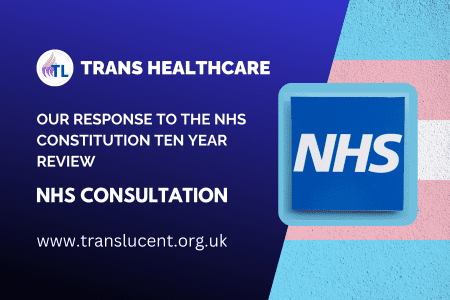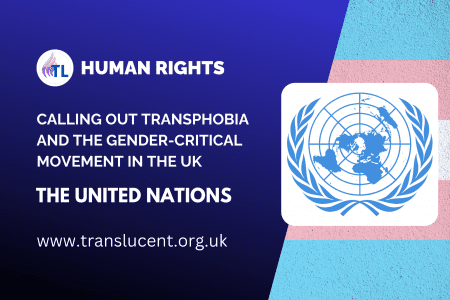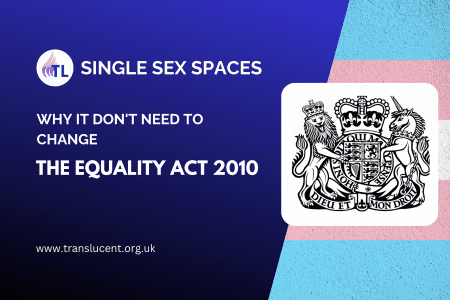Dark forces are at work – not content to allow trans people to live their lives as their authentic selves; there is a global movement that wants society to believe that many trans folks are unhappy and then detransition. That movement is the gender-critical movement that allies with the right-wing media to enforce the binary and suggest that being trans is a ‘fad’ or a ‘figment’ of trans people’s minds.
But trans people do exist, and in the UK, one in every two hundred people are trans and many transition to the opposite sex – with virtually everyone finding true happiness.
However, a small percentage then go on and detranistion (often known as detrans), albeit that evidence suggests that those who do often transition for a second time. The reasons for detransition vary, but the most common reasons given are pressure from parents, difficulties in transitioning and harassment and discrimination. Others experience employment issues and pressure from others who may disagree, such as a religion or so-called “friends”.
In reality, numerous worldwide sources prove that detransition rates are incredibly low.
For example, in August 2023, one research paper from the United States stated that people with a gender-affirming mastectomy (sometimes called top surgery), had extremely low rates of decisional regret and extremely high levels of satisfaction with their decision to have the procedure. Not one person had any intention to detransition. Also, in August 2023, PubMed published a report confirming surgery improves trans people’s lives.
In 2018 a study by the Williams Institute, also based in the US, stated that only 0.4% of transgender adults had de-transitioned at some point. Of those who de-transitioned, most did so only temporarily. ABC News published an article in December 2019, calling out the lies of those who claim detrans rates are high.
A study in Sweden published in 2011 and led by Cecilia Dhejne found that 2.2% of transgender adults in Sweden detransitioned with Scientific Nordic reporting:
In the course of these 50 years, a total of 681 persons had sex reassignment surgery, thus changing their legal gender. Fifteen had regrets afterwards. In other words, two per cent applied to have the surgery reversed to get the gender they had at birth.
Another study published in the journal “Clinical Psychological Science” in 2021 found that the rate of de-transitioning in the Netherlands was 0.6%. Of those who de-transitioned, most did so only temporarily. Only 0.1% of transgender adults had de-transitioned permanently.
In 2016 Dr Michael Irwig, an endocrinologist and director of transgender medicine at Beth Israel Deaconess Medical Center in Boston, published his study. He surveyed 46 transgender men who underwent a mastectomy and found that:
- 98% of them were satisfied with the surgery
- 2% of them regretted the surgery
- None of them detransitioned
- The main reasons for regret were poor cosmetic outcomes, loss of sensation, and social stigma
He concluded mastectomy is a highly effective intervention for transgender men with gender dysphoria.
Irwig, in particular, has a great interest in ascertaining detrans rates and, in June 2022, published an overview of research. While all the studies he quoted show very high satisfaction rates in transition, he warns that detransition may become more common in future. He argues that on the basis that it is now easier to transition than decades ago, but our counter to that is that as trans hate crime rises, in the UK, 56% in the last year alone, some detrans because of hate.
In July 2022, The American Academy of Pediatrics released their study showing detrans rates of youth after five years of living in their new gender. This study found a higher rate of detrans but concluded:
“These results suggest that retransitions are infrequent. More commonly, transgender youth who socially transitioned at early ages continued to identify that way. Nonetheless, understanding retransitions is crucial for clinicians and families to help make retransitions as smooth as possible for youth”.
In March 2021, PubMed published a report led by Valeria P Bustos, which concluded “
A total of 27 studies, pooling 7928 transgender patients who underwent any type of GAS, were included. The pooled prevalence of regret after GAS was 1% (95% CI <1%–2%). Overall, 33% underwent transmasculine procedures and 67% transfemenine procedures. The prevalence of regret among patients undergoing transmasculine and transfemenine surgeries was <1% (IC <1%–<1%) and 1% (CI <1%–2%), respectively”.
In June 2021, GenderGP founded in the UK, released details of their study, like us referencing the gender-critical movement and how they like to exploit detransition. They quoted these stats concerning transition regret.
In the UK, a survey of 3398 attendees of a gender identity clinic found that just sixteen – about 0.47% – experienced transition-related regret. Of these, even fewer went on to actually detransition and become detransitioners.
In the US, a survey of nearly 28,000 people found that 8% of respondents reported some kind of detransition. Of this 8%, 62% per cent only did so temporarily due to societal, financial, or family pressures.
This study would suggest that the overall detransition rate was slightly over 3%
In Sweden, a fifty-year longitudinal study on a cohort of 767 transgender people found that around 2% of participants expressed regret following gender-affirming surgery. However, it is unclear how many of these participants detransitioned.
In the Netherlands, a study of transgender young people found that only 1.9% of young people on puberty blockers did not want to continue with the medical transition.
As an average, it is probably reasonable to suggest that around 2% of trans people detransition, meaning that 98% are happy that they found their true selves. But that is not to say all people find happiness, so the bottom line is transitioning to a new gender should only be undertaken after lengthy consideration.











 To provide the best experiences, we use technologies like cookies to store and/or access device information. Consenting to these technologies will allow us to process data such as browsing behaviour or unique IDs on this site. Not consenting or withdrawing consent, may adversely affect certain features and functions.
To provide the best experiences, we use technologies like cookies to store and/or access device information. Consenting to these technologies will allow us to process data such as browsing behaviour or unique IDs on this site. Not consenting or withdrawing consent, may adversely affect certain features and functions.